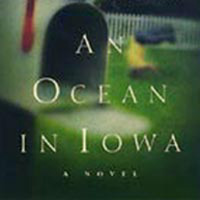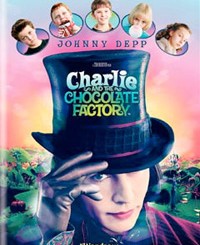 Peter Hedges
Peter Hedges
An Ocean In Iowa (Hyperion)
An interview with Peter Hedges
by Michael McCarthy
In 1991, a novel entitled What’s Eating Gilbert Grape was published. Admittedly, it wasn’t until a few years later that I came to read it, after seeing the film starring Johnny Depp, Leonardo DiCaprio, Juliette Lewis, and good ol’ Crispin “Hellion” Glover. I still recall walking through a certain bookstore I won’t bother to name and happening across the book. I picked it up, ready to curse it, figuring it was one of those hack novelizations based on a screenplay, and was surprised to find that it was written by the same person who’d penned the script. That would be Peter Hedges. Needless to say I bought the book and was impressed. Although the vibe was quite different, it was as vivid as the film and equally memorable. Cormac McCarthy meets J.D. Salinger, I believe I told a friend. Now, seven years later, Hyperion has released Hedges’ second novel, An Ocean in Iowa. It’s the story of a young boy by the name of Scotty Ocean. A boy in 1969 Iowa who decides seven is going to be his year just in time to see his mother leave and his life, well, unravel. The word vivid again comes to mind, though touching is perhaps the best way to describe it, the novel invoking the sort of warm yet somehow simultaneously sad feelings the movie What’s Eating Gilbert Grape inspired.
Seven years passed between the time What’s Eating Gilbert Grape was first published and the release of your new novel, An Ocean in Iowa. When did you start work on An Ocean in Iowa?
In 1991. I started it the summer before Gilbert Grape came out.
Was it a difficult book to write? Or was it a matter of finding a publisher?
No, I sold the book in 1994. So, about three years to write it, to get it to that place. I found that it’s a very delicate book. That any piece out of place and the thing would unravel. Because of the kind of story it is, it needed to be told beautifully. So, I did five more drafts after it found a new home. It was taking the time to get it right.
Do you think that has more to do with patience for the craft of writing or being a perfectionist?
I think it’s a mixture of the two. It was a difficult book to write because it was a second novel and, traditionally, second novels are harder to write. But the nature of the story demanded an economy in the writing and a careful selection of images and beats and moments. Some of it was perfectionism, but, also, I wanted it to read effortlessly. I wanted its complexities to not be visible, so that the reader felt as though they’re reading a very simple story, and yet it’s actually much more complex than it appears.
Even though it’s written in third person, it feels as though it’s coming from a child’s voice.
Because it’s a seven-year-old boy, you couldn’t write it in the first person. The seven-year-olds I know would not be able to carry a narrative the way I needed the narrative to be carried.
The elements that you need to set up to have a plot would have seemed too forced. Or you’d have to leave them out to convince the reader it’s actually a seven-year-old telling it.
That’s right.
Did you try writing it in the first person in the beginning?
The first two years of writing on the book, I wrote in Big Chief notebooks, which were the notebooks of choice when I was a kid, and much of it was written in pencil. And by hand, obviously. That was the only technique I used to try to get back in touch with that place and how a child thinks.
 Why the change of publishers?
Why the change of publishers?
First of all, Poseidon Press was closed at Simon and Schuster. My publisher went to Crown, actually. And I had fully intended to publish with her. It’s complicated, but the book had to go out to Simon and Schuster first, because they had published the first book. My agent said, “You may want to send it to a number of people, just so you can meet some other people in the business.” And I did. In that process I met an editor at William Morrow who had the most critical and tough things to say about my book. He actually rejected publishing the book, and I had other people who wanted to publish, including my former editor. But his comments were so smart, I just asked to have a meeting with him. His rejection letter was so astonishing and insightful. I met with him and we talked. I had that meeting with no intention that he would publish my book. I thought I could pick his brain some more, because I knew I was going to do more work on it. In that meeting, we connected in a great way. It was quite bittersweet because I parted with an editor who was really wonderful. I just felt that in this circumstance I would be able to write the best book. I wasn’t in a hurry to get it published and he promised me that we would not publish until it was ready. Until we both felt it was ready. I wanted to take a step in my writing. I wanted it to be elite in terms of the economy with which I write and the power with which I write. This man was going to help me realize the best book.
Most people want that instant “yes, we’ll publish,” but it would stand to reason that sometimes you need someone who’s going to say, “No, you’re not ready yet.”
Ironically, it ended up that he finally ripped the book away from me. “You cannot make anymore changes. Don’t call me regarding any changes whatsoever. Call me for any other reason but.” He snatched the book away. He said, “It’s ready now. Go on to your next one.” I’ve heard it said that it takes two people to paint a picture, one to paint it and the other to say when it’s done. It was a very, very positive writer and editor experience. As was my first book. They’ve both been very good experiences.
Are you completely satisfied with the book as published, or are there still one or two little things you wish you could…
Oh, sure, sure. There are areas that I think are not as strong as other areas. But I do feel like it was as much as I could put together at this point in my life. And that’s a good feeling. I think that’s the feeling with which anyone should publish. If they can have that feeling and go, “Yes, it’s imperfect and I wish it were a little better here or there.” The funny thing is, there are sections in the book – though not many – that I would possibly trim or get rid of, and every time, someone tells me that that was one of their favorite parts. We’re not always the best judge of our own work.
How did you go about researching 1969 Iowa?
Well, I did a number of things. I went back to Iowa and I read every newspaper. To say I read them completely, I didn’t, but I spent several days in the Des Moines library going through the newspapers. And I went through the West Des Moines library. I spent a lot of time in the Museum of Broadcasting, where I watched a number of old television shows and TV commercials. I looked through old TV Guides. I looked through Sears catalogs and Montgomery Ward catalogs. I went to the Schwinn Museum in Chicago to get the appropriate description of a bicycle. I recalled some of my own memory of things, but I wanted to get those details right, because television, products and toys mean so much to children.
I understand you have two children of your own now. Did you have them before you began work on An Ocean in Iowa?
No, no. In fact, I sold the book a week after my first son was born. I was finishing that draft in the final months before he was born. That had great impact on me because I knew my life was about to be changed and I wanted to complete the book before he came to the planet. I’m sure they’ve affected the writing somewhat in my revisions, but not so much. It’ll be very interesting when he turns seven to see what a real live seven year old is like, as opposed to the one that I made up.
If he turns out to be one of the few seven-year-olds in the U.S. today who enjoys reading, how would you feel about him reading An Ocean in Iowa at the same age as your character?
He probably needs a few more years, but when I think of the things he’s exposed to – even when you try to keep them from watching things on television, the images that pervade our media today in books commercials and billboard ads. I haven’t really thought about it, but the day when they sit down to read something I wrote will be very, very interesting. I’m sure he’ll have a lot of criticisms. [Laughs] “No way, Dad.” But I did read recently how John Irving gave The World According to Garp to his son to read. He writes an essay about when his son read it. He was about 14 at the time. How nervous [Irving] was when he was reading it. I thought that was sweet.
Your child may read An Ocean in Iowa and assume that’s your childhood.
Well, I think that will be assumed, and I’ll have to tell him that some of it is and most of it isn’t. Maybe it will make him remember his more than most people remember theirs. That’s what I found touring around the country. A lot of people don’t remember being seven. Can’t remember what they thought or felt. Nor did I necessarily when I started writing. If people read the book and have a newfound respect for children and that age – and that what is so seemingly small to us as adults can be giant to a child – if any of that can come into play in their consciousness after having read the book then I’m a happy, happy writer.
Both An Ocean in Iowa and What’s Eating Gilbert Grape contain functional yet sort of dysfunctional families where one parent makes an exit, though obviously in two very different ways. So, one has to wonder, do you come from a single parent home?
Yes.
And did you have a lot of brothers and sisters?
Two brothers and a sister.
I heard a rumor that your wife came up with the title An Ocean in Iowa. Is that true?
It’s pretty close. What happened was we were trying to title Gilbert Grape and I used to call it Other Grapes. My attorney called up and said if you call him Ollie Ocean instead of Gilbert Grape you could call the book Oceans of Iowa. And I thought that was a great title, but I hated the name Ollie Ocean. So, I put that aside. But when I started writing this book, I found myself using the name Ocean. The book was called Seven for a long time, but then, of course, the movie came out. Then I called it The Seven Dance, but I never liked that title. One day my wife and I were riding along in the car and we said we’ve got to come up with a better title because I just can’t weather another book with a weird, weird title. Somehow we got bantering back and forth and maybe I brought up The Oceans of Iowa and she said, “Well, what about An Ocean in Iowa?” And there we were.
Sort of came full circle in that regard.
Yes. And of course now I tell people the book was titled Seven and they go, “I would never want to read a book called Seven. But An Ocean in Iowa, that sounds interesting.”



